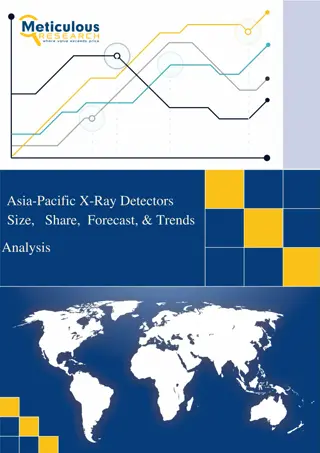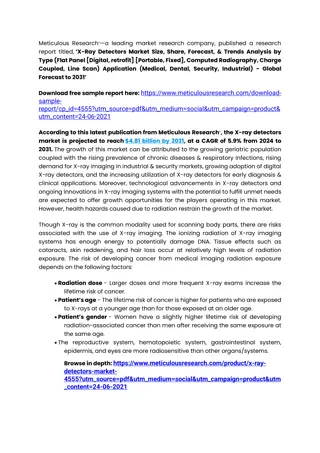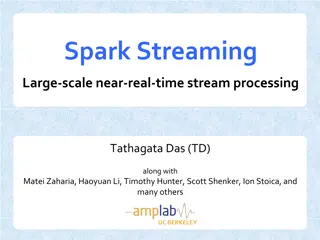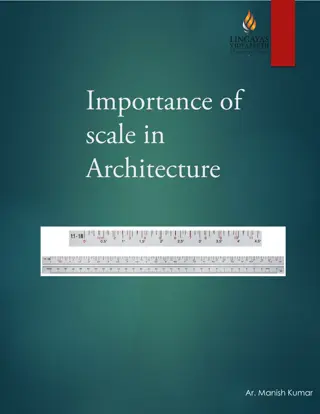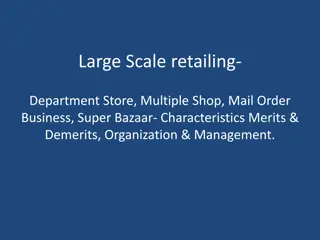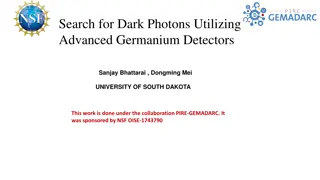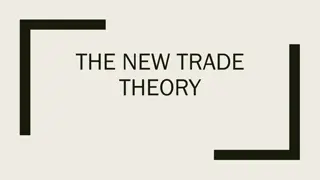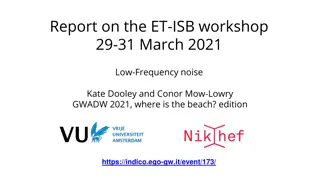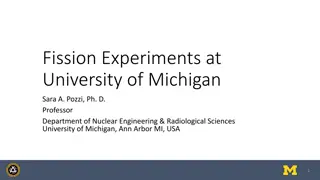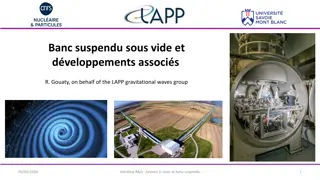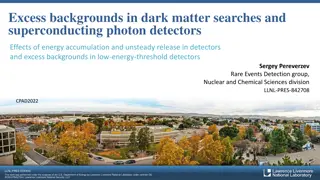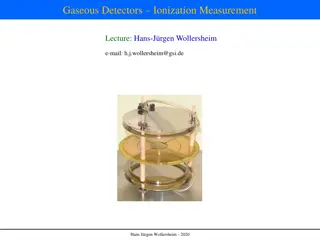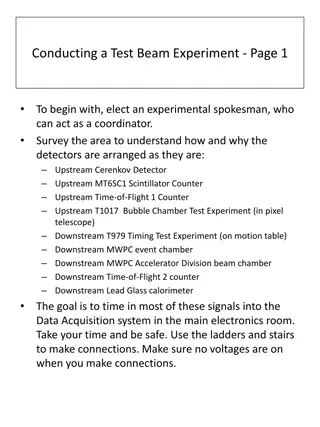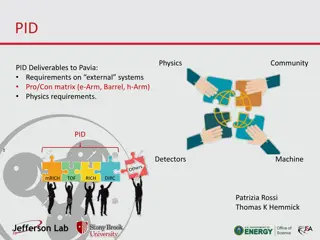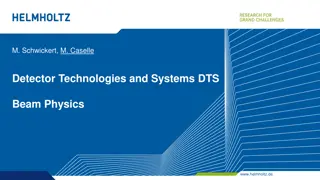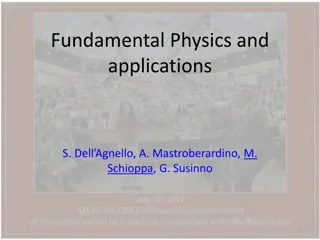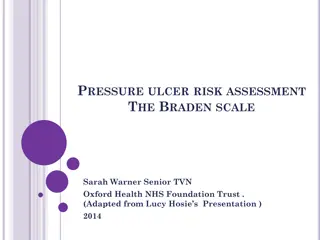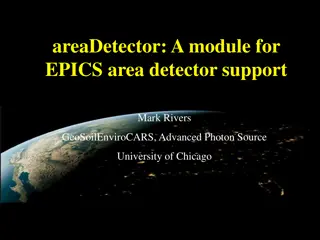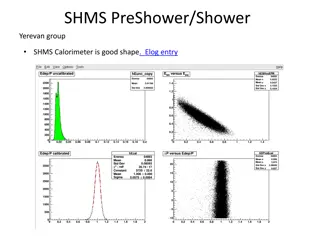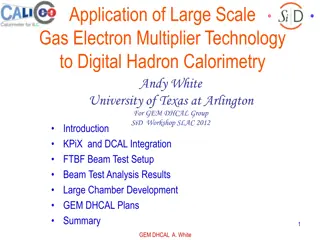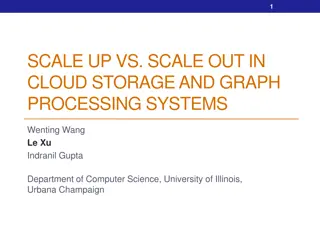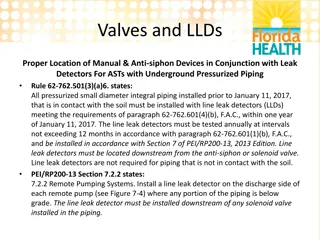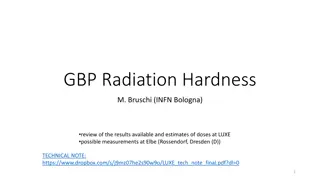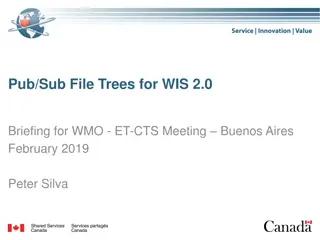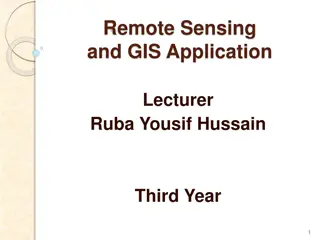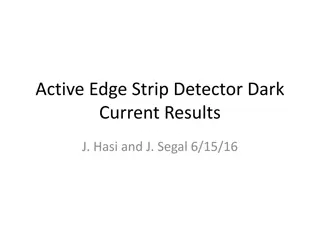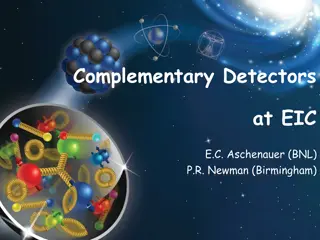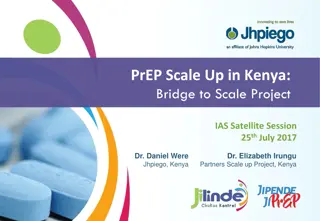X-ray Detectors Market: Type, System and Application
Meticulous Research\u00ae, a leading global market research company, published a research report titled, \u2018X-ray Detectors Market by Product Type (FPD, CSI, GADOX, CR, CCD), FOV (Large, Medium, Small), Portability (Portable, Fix), System (New, Retrofit), And Application [Medical (Mammogram, Spin
2 views • 2 slides
Innovations in Pixel Detector Technology for Photon Science
Technologies and advancements in pixel detector development for photon science applications are showcased in this content. Topics discussed include balancing gain and dynamic range in hybrid pixel detectors, performance assessments of integrating pixel detectors, and strategies for photon detection
4 views • 21 slides
Understanding Scale Factors and Ratios in Similar Figures
Explore the concept of scale factors and ratios in similar figures through visible learning intentions, warm-up exercises, and practical examples. Learn to determine the scale factor between two similar figures, use scale factors to find missing sides, and apply the knowledge in real-world scenarios
3 views • 13 slides
asia pacific x ray detecter
X-ray detectors are devices or systems used to capture and record X-ray images for medical, industrial, scientific, or security purposes. They are essential tools for visualizing the internal structures of objects and organisms through the use of X-ray radiation. X-ray detectors are used in a variet
1 views • 3 slides
xray detecter
X-ray detectors are devices or systems used to capture and record X-ray images for medical, industrial, scientific, or security purposes. They are essential tools for visualizing the internal structures of objects and organisms through the use of X-ray radiation. X-ray detectors are used in a variet
1 views • 2 slides
Introduction to Spark Streaming for Large-Scale Stream Processing
Spark Streaming, developed at UC Berkeley, extends the capabilities of Apache Spark for large-scale, near-real-time stream processing. With the ability to scale to hundreds of nodes and achieve low latencies, Spark Streaming offers efficient and fault-tolerant stateful stream processing through a si
0 views • 30 slides
Importance and Types of Scale in Architecture
Scale is crucial in architecture for accurate designs and execution. Standard scales are used in architectural drawings to set object sizes, such as human scale and miniature scale. Human scale relates to human dimensions, while miniature scale reduces object sizes. Understanding these scales enhanc
1 views • 6 slides
Understanding Large Scale Retailing and Store Classification
Large scale retailing encompasses department stores, multiple shops, mail-order businesses, and super bazaars. It can be classified into store-based and non-store based retailing, further divided based on ownership and merchandise offered. Store-based retailers include independent retailers, chain r
1 views • 16 slides
Search for Dark Photons Utilizing Advanced Germanium Detectors at University of South Dakota
Research at the University of South Dakota under the collaboration PIRE-GEMADARC focuses on developing advanced germanium detectors with low energy thresholds for detecting low mass dark photons. The study aims to optimize event detection using new Ge detectors with internal charge amplification. Th
0 views • 16 slides
The New Trade Theory and Economies of Scale in International Trade
The New Trade Theory, emerged in the 1970s, challenges traditional trade theories by emphasizing the role of increasing returns and economies of scale in international trade. It introduces the concept of industrial organization and imperfect competition to explain how countries trade not only based
0 views • 12 slides
Understanding Acids and Bases: pH Scale Explained
Exploring the pH scale, this content delves into the fundamentals of acidity and alkalinity, covering what pH stands for, the inventor of the pH scale, reactions when acids and bases combine, and where the weakest acids and bases are found on the pH scale.
0 views • 7 slides
Insights from ET-ISB Workshop on Low-Frequency Noise and GWADW 2021
The ET Instrument Science Board held a workshop focusing on addressing key challenges related to low-frequency noise in gravitational wave detectors. Experts discussed topics such as mirror temperature, dealing with low-frequency noise realities, and facility limits. The workshop highlighted the sig
0 views • 13 slides
Advanced Fission Experiments at University of Michigan
The University of Michigan, under the guidance of Dr. Sara A. Pozzi, conducts cutting-edge fission experiments leveraging organic scintillation detectors. These detectors offer advantages such as nanosecond-scale response times, energy proportionality, and scalability. The experiments focus on impro
0 views • 4 slides
Advances in Optical Bench Technology for Gravitational Wave Detectors
This content discusses the latest advancements in optical bench technology for gravitational wave detectors, focusing on precise measurements of back-scattered light, development of new optical cavities, and testing of Sagnac interferometers. Key objectives include improving suspension controls, red
0 views • 13 slides
Neutrino Detectors for NuStorm: Physics Goals and Detector Requirements
Physics goals for neutrino detectors in the NuStorm project include measuring exclusive neutrino cross sections, supporting long baseline programs, searching for sterile neutrinos, and improving measurements. Detector requirements involve reconstructing neutrino interactions, providing charge and pa
0 views • 21 slides
Insights into Excess Backgrounds in Dark Matter Searches and Energy Accumulation Effects in Detectors
Explore the impact of excess backgrounds in dark matter searches, energy accumulation, and unsteady releases in detectors. Delve into the implications on low-energy-threshold detectors and the emergence of complex effects in various detector types due to energy accumulation and delayed releases.
3 views • 23 slides
Insights into Gaseous Detectors for Ionization Measurement
Delve into the world of gaseous detectors for ionization measurement, as discussed by Hans-Jürgen Wollersheim. Topics include the Bethe-Bloch formula, ionization detectors, effective ionization energies, charge transport in gas, ion mobility, and electron mobility in gases. Explore concepts such as
2 views • 29 slides
Consultation on 2023/24 Fee Scale by PSAA: Key Points and Deadlines
PSAA is conducting a crucial consultation to set the fee scale for 2023/24, involving elements like audit fees, legal framework, and consultation details with stakeholders. The process includes setting scale fees, handling fee variations, adhering to statutory roles, and addressing the audit backlog
0 views • 30 slides
Conducting a Test Beam Experiment - Step-by-Step Guide
In this step-by-step guide, you will learn how to set up and conduct a test beam experiment. The experiment involves connecting detectors such as Cerenkov Detectors, Scintillator Counters, Bubble Chambers, and more. The process includes handling signal cables, high voltage connections, and checking
1 views • 5 slides
Understanding Scale Factors and Similar Shapes in Graphic Design
Graphic artists often need to resize shapes for different purposes while ensuring they maintain their original proportions. This involves determining the scale factor between similar shapes, understanding how to find the scale factor using corresponding sides, and dealing with scenarios where sides
0 views • 8 slides
Understanding Horizontal Boundaries of Firms in Economics
Exploring the concept of horizontal boundaries in firm behavior, this lecture delves into Long-run Average Cost curve, economies and diseconomies of scale, optimal plant size, and the Minimum Efficient Scale. It discusses how economies of scale affect production costs and the relationship between ma
0 views • 25 slides
WMO Scale of Assessment and Working Capital Fund
The WMO Scale of Assessment for members' contributions and the Working Capital Fund is based on the United Nations Scale, adjusted for differences in membership every 3 years. The latest scale approved by EC-75 for 2023 uses the UN scale from December 2021. The rates for 2026-2027 will be determined
0 views • 9 slides
PID Physics Community Deliverables to Pavia: Requirements and Developments
Requirements and developments of external systems and detectors (e-Arm, Barrel, h-Arm) for PID Physics Community to Pavia are detailed. The deliverables include Pro/Con matrices, physics requirements, and advancements in detectors such as mRICH, TOF, RICH, and DIRC. Various simulation results, advan
0 views • 13 slides
Advanced Beam Diagnostics and Control Systems in Beam Physics
Cutting-edge detector technologies like KAPTURE and KALYPSO are revolutionizing beam diagnostics with ultra-fast Terahertz detectors and advanced line-camera systems. The POF III and POF IV projects focus on extreme beam control and diagnostics, aiming to probe femto-scale dynamics of relativistic p
0 views • 8 slides
Advances in Experimental Particle Physics and Metrology Technologies
This collection of images and text highlights the essential aspects of fundamental physics experiments, particle physics detectors, and the Atlas ITk project. It also focuses on the importance of metrology for physics and satellite experiments, with a specific emphasis on laser technologies. The con
0 views • 11 slides
Understanding Pressure Ulcer Risk Assessment with the Braden Scale
Pressure ulcer risk assessment is crucial in healthcare settings to identify individuals at risk of developing pressure ulcers. The Braden Scale, developed in 1984, evaluates six key elements contributing to pressure ulcer development. It provides a standardized method for assessing risk levels base
0 views • 20 slides
Understanding EPICS areaDetector Module for Advanced Photon Source at University of Chicago
This content delves into the areaDetector module for EPICS, supporting various detectors used in research settings like synchrotron beamlines. It covers the motivation, goals, architecture, data structures, and detector drivers involved, emphasizing the versatility, efficiency, and support provided
0 views • 35 slides
Updates on Calorimeter and Cherenkov Detectors in Yerevan Group's SHMS and HMS
Check out the latest updates on the calorimeter and Cherenkov detectors of Yerevan Group's SHMS and HMS. The SHMS detectors are in good shape, while adjustments in HV are needed for the HMS Cherenkov detectors to achieve optimal performance. Images and descriptions are provided in the Elog entries.
0 views • 6 slides
Application of Large-Scale Gas Electron Multiplier Technology to Digital Hadron Calorimetry by Andy White
Andy White from the University of Texas at Arlington presented on the application of Large-Scale Gas Electron Multiplier (GEM) technology to digital hadron calorimetry at the SiD Workshop in SLAC 2012. The study focuses on developing precision calorimetry for future accelerators using Double GEM lay
0 views • 36 slides
Comparing Scale-Up vs. Scale-Out in Cloud Storage and Graph Processing Systems
In this study, the authors analyze the dilemma of scale-up versus scale-out for cloud application users. They investigate whether scale-out is always superior to scale-up, particularly focusing on systems like Hadoop. The research provides insights on pricing models, deployment guidance, and perform
0 views • 27 slides
Proper Installation of Valves and Leak Detectors for Pressurized Underground Piping
According to Florida administrative code rule 62-762.501(3)(a)6., all pressurized small diameter integral piping in contact with soil must have line leak detectors installed within one year of January 11, 2017. These detectors should be downstream from the anti-siphon or solenoid valve and tested an
0 views • 4 slides
Exploring Particles and Detectors in Particle Physics Conference
Delve into the world of particle physics with a focus on particle detectors and pronunciation of particle names. Join a diverse group of participants from various countries as they discuss topics like the Large Hadron Collider and particle interactions. Test your pronunciation skills and learn about
0 views • 25 slides
Detector Assembly and Cryogenics Requirements for ILD Project
The ILD project involves assembling detectors using pre-assembled pieces on surface and lowering them into the assembly area. The detectors are equipped with various components like muon detectors, solenoids, and calorimeters. Magnetic field measurements are carried out during the assembly process.
0 views • 11 slides
Advancements in Sapphire Detectors for Radiation Hardness Testing and High-Energy Physics Experiments
Reviewing radiation hardness testing, dose estimates, and measurements at LUXE, this content delves into the use of sapphire detectors in high-energy physics experiments. Highlighting sapphire's material properties, such as high radiation resistance, low cost, and specific characteristics, the text
0 views • 13 slides
Effective Data Transport Strategies for Large-Scale Operations
Explore strategies for efficient data transport in large-scale operations, emphasizing moving towards more extensive data types, ensuring security, transparency, and manageability. Detailing transport options like (S)FTP(s) and HTTP(s) while prioritizing simplicity and flexibility. Considerations fo
0 views • 32 slides
Remote Sensing and GIS Applications in Photogrammetry: Understanding Scale Variations
Exploring the fundamental principles of photogrammetry in remote sensing and GIS applications, this content delves into the science of measurements from aerial photographs. It discusses the implications of scale differences on maps and aerial photographs, emphasizing the variations in scale due to t
0 views • 19 slides
Comparative Study of Different Strip Detectors for Dark Current Results
Explore various strip detectors including old baseline, extra-distance, and guard ring surrounding detectors through images showing pixel current behavior when biased. The study highlights the impact of guard ring presence on lowering pixel current in these detectors.
0 views • 6 slides
Complementary Detectors for High-Luminosity Experiments
The work discusses the need for high luminosity at full acceptance in accelerator experiments, outlining boundary conditions and requirements for detectors. Various images illustrate the integration of experimental equipment in the IR, highlighting the structure and components of central detectors.
0 views • 13 slides
PrEP Scale Up in Kenya: Bridge to Scale Project Overview
PrEP Scale Up in Kenya: Bridge to Scale Project sessions in 2017 discussed the National HIV Prevalence, PrEP journey, TWG composition, milestones, sub-committees, and outputs focusing on scaling up PrEP as an effective HIV-prevention intervention.
0 views • 20 slides
Understanding Scale Drawings and Compass Points
Learn to interpret information from problems, create scale drawings, solve real-life problems using scale drawings, understand compass points, and follow directions accurately. Practice solving problems involving scale drawings, bearings, compass points, and map directions to enhance your spatial sk
0 views • 19 slides


